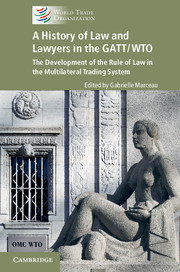(image source: CUP)
Gabrielle Marceau (WTO Secretariat, Geneva) published a collective work at Cambridge University Press on A History of Law and Lawyers in the GATT/WTO. The Development of the Rule of Law in the Multilateral Trading System
Abstract:
How did a treaty that emerged in the aftermath of the Second World War, and barely survived its early years, evolve into one of the most influential organisations in international law? This unique book brings together original contributions from an unprecedented number of eminent current and former GATT and WTO staff members, including many current and former Appellate Body members, to trace the history of law and lawyers in the GATT/WTO and explore how the nature of legal work has evolved over the institution's sixty-year history. In doing so, it paints a fascinating portrait of the development of the rule of law in the multilateral trading system, and allows some of the most important personalities in GATT and WTO history to share their stories and reflect on the WTO's remarkable journey from a 'provisionally applied treaty' to an international organisation defined by its commitment to the rule of law.
=> Provides a new perspective on the role of law and lawyers in the GATT/WTO Secretariats which highlights the multiple roles of lawyers and non-lawyers in enhancing the rule of law in the multilateral trading system
=> Offers an historical and analytical description of the evolution of the rule of law in the GATT/WTO systems and the various and sometimes contradictory ways in which commitment to the rule of law has manifested itself in the multilateral trading system
=> Contributions from a wide range of current and former GATT and WTO staff, as well as members of the Appellate Body, provide unprecedented insights into the legal work in the multilateral trading system, as experienced by a wide range of persons
Table of contents:
1. Introduction and overview
2. Moving towards an international rule of law? The role of the GATT and the WTO in its development
Part I. The Role of Law and Lawyers in the GATT System:
1948–92: Infancy: Reflections on the Origins of Legalization in the GATT:3. We were young together: at the GATT, 1956–58
4. Law and lawyers in the multilateral trading system: back to the future
5. Towards a GATT legal office
6. A short history of the rules division
Childhood: the Tokyo Round and the establishment and work of the first legal office:
7. Remembrance of things past: my time at the GATT
8. The first years of the GATT legal service
9. Early dispute settlement in the GATT
10. GATT dispute settlement practices: setting the stage for reform
11. The role of law in international trade relations and the establishment of the Legal Affairs Division of the GATT
12. From the GATT to the WTO: a personal journey
13. The establishment of a GATT Office of Legal Affairs and the limits of 'public reason' in the GATT/WTO dispute settlement system
14. Evolving dispute settlement practice with respect to anti-dumping in the late 1980s and early 1990s
Part II. Legal Work After the Entry into Force of the WTO:
1993–95: Adolescence: Transition from the GATT to the WTO:15. The Legal Affairs Division and law in the Uruguay Round and the GATT
16. Taking care of business: the Legal Affairs Division from the GATT to the WTO
17. From the GATT to the WTO: the expanding duties of the Legal Affairs Division in non-panel matters
18. The WTO Dispute Settlement Body: procedural aspects of its operation
Young adult: the WTO as a formal international organisation:
19. Making law in 'new' WTO subject areas: competition policy and government procurement
20. The meat in the sandwich
21. From theory to practice: drafting and applying the Dispute Settlement Understanding (DSU)
22. WTO panel composition: searching far and wide for administrators of world trade justice
23. Legal counsel to the administration: a legal adviser who should not look like one
24. Outside looking in, after many years on the inside looking out
Part III. The Changing Legal Character of the Multilateral Trading System:
1996 to Today: Adulthood: The Quasi-Judicialization of the Panel Process by the Rules and Legal Affairs Divisions:25. The first years of WTO dispute settlement: dealing with controversy and building confidence
26. From Seattle to Doha: from the surreal to the unreal. A personal account
27. Extending the scope and strengthening the legitimacy of WTO dispute settlement and some personal recollections Bruce Wilson
28. Working in WTO dispute settlement: pride without prejudice
29. The meaning of everything: the origin and evolution of the GATT and the WTO analytical index
30. When science meets law: the rule of law in the development of the panel's expert consultation process
Gaining maturity: the appellate body and the impact of the appellate review on the development of international trade law:
31. The founding of the appellate body
32. The authority of an institution: the appellate body under review
33. Launching the appellate body
34. Revisiting the appellate body: the first six years
35. Not in clinical isolation
36. The appellate body in its formative years: a personal perspective
37. Reflections on the functioning of the appellate body
38. A country boy goes to Geneva
39. Contribution of the WTO appellate body to treaty interpretation
Part IV. Looking Ahead: New Challenges and Opportunities:40. Advising the Director-General: brevity is the soul of wit, even for a lawyer
41. The Legal Affairs Division at thirty and beyond
42. Will the increased workload of WTO panels and the appellate body change how WTO disputes are adjudicated?
43. Concluding remarks.


No comments:
Post a Comment
Note: Only a member of this blog may post a comment.